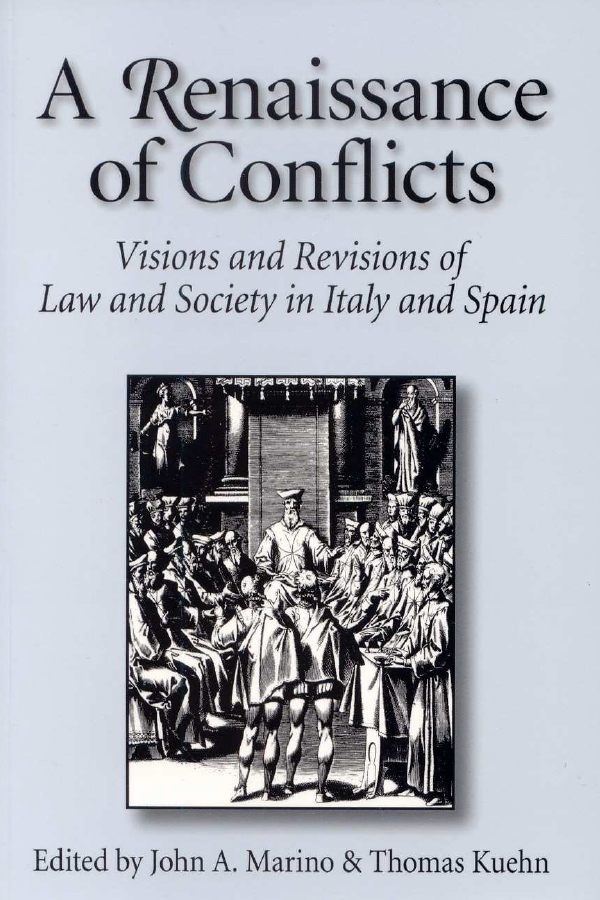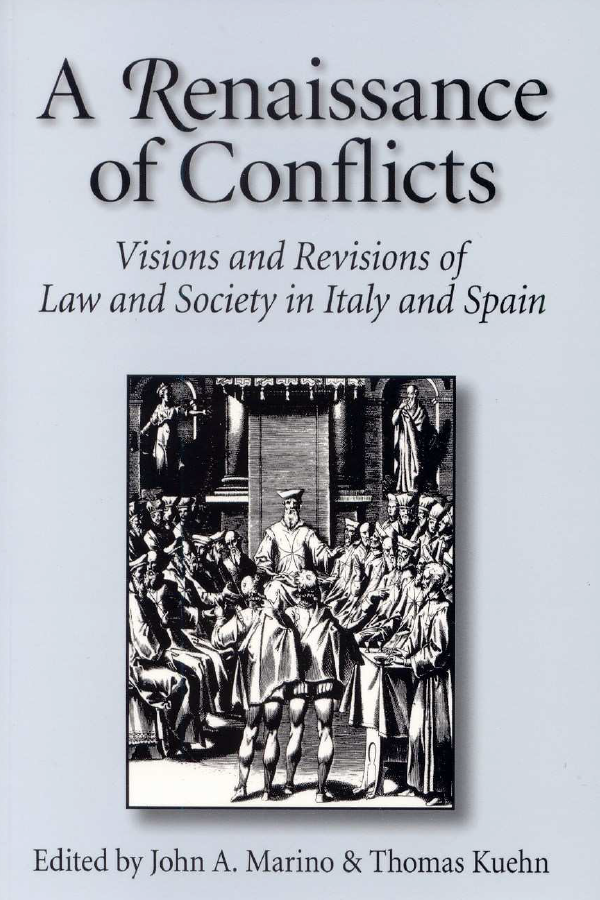A Renaissance of Conflicts: Visions and Revisions of Law and Society in Italy and Spain
Edited by John A. Marino and Thomas Kuehn - ES03
Overview
The essays in this collection study conflict and continuity across the spectrum of political, jurisdictional, and spiritual traditions from late medieval Umbria and Tuscany to sixteenth- and seventeenth-century Venice, Rome, and Castile. They point to a shared tradition of dispute and resolution in both ecclesiastical/spiritual and state/secular matters, whether of private conscience or public policy. Continuity of ideals, of problems, and of modes of resolution suggests that sharp breaks in legal, political, or religious ideals and behaviour were not as frequent and not as sharp as many historians have argued. These continuities emerge from a common methodological approach grounded in close, careful reading of key texts and their polyvalent terms. Whether those were the terms of civil or canon law, spirituality, or astrology, each author has had to grapple with their multiple possibilities, contexts, custom, and practice that reveal the shifts and continuities in their possible meanings. As Anthony Grafton’s Foreword describes, he and the authors share a debt to the remarkable collaboration between Eric Cochrane (1928-1985) and Julius Kirshner, two leading scholars and teachers at the University of Chicago between 1970 and 1985. Lauro Martines—Cochrane and Kirshner’s colleague and friend in Florentine history—examines the challenges and consequences of this emphasis on “contexts” in his incisive thoughts on historiographical practices in his Epilogue.
Edited by John A. Marino and Thomas Kuehn.
John A. Marino (University of California, San Diego) is the author of Pastoral Economics in the Kingdom of Naples (1988), has edited Early Modern Italy, 1550-1796 (2002) and Early Modern History and the Social Sciences: Testing the Limits of Braudel’s Mediterranean (2002). He has also co-edited and co-translated Good Government in Spanish Naples (1990).
Thomas Kuehn (Clemson University) is the author of Emancipation in Late Medieval Florence (1982), Law, Family & Women: Toward a Legal Anthropology of Renaissance Italy (1991), and Illegitimacy in Renaissance Florence (2002), and a co-editor of Time, Space, and Women’s Lives in Early Modern Europe (2001).
456 pp.
ISBN: 978-0-7727-2022-1 softcover
Published: 2004
Contents
Illustrations
Acknowledgements
Eric Cochrane and Julius Kirshner at the University of Chicago, Anthony Grafton
John A. Martino and Thomas Kuehn, Introduction
Part I: Law, Commentary, and Consulting
1. Osvaldo Cavallar, “River of Law: Bartolus’s Tiberiadis (De alluvione)”
2. Susanne Lepsius, “Public Responsibility for Failure to Prosecute Crime? An Inquiry into an Umbrian Case by Bartolo da Sassoferrato”
Part II: Usury
3. Lawrin Armstrong, “Usury, Conscience, and Public Debt: Angelo Corbinelli’s Testament of 1419”
4. Daniel Bornstein, “Law, Religion, and Economics: Jewish Moneylenders in Christian Cortona”
Part III: Citizenship and Inheritance
5. James Grubb, “Piero Amadi Imitates His Betters: ‘Original Citizenship’ in Venice”
6. Thomas Kuehn, “Literature Meets Law: A Consilium of Antonio Strozzi for Lodovico Ariosto”
Part IV: Religion and Society
7. Lu Ann Homza, “How to Harass an Inquisitor-General: The Polyphonic Law of Friar Francisco Ortíz”
8. William V. Hudon, “A Bridge Between Renaissance and Counter-Reformation: Some Sources of Theatine Spirituality”
Part V: Politics, History, and Prophecy
9. John A. Marino, “An Anti-Campanellan Vision on the Spanish Monarchy and the Crisis of 1595”
10. Brendan Dooley, “The Morandi Affair and Seventeenth-Century Rome”
11. Lauro Martines, “Epilogue: Contexts”
Couldn't load pickup availability


